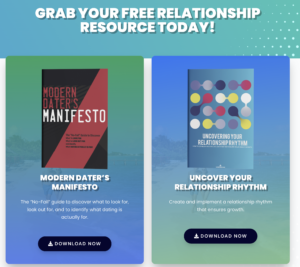6 Signs Your Relationship May Be Toxic
We now live in an age where people can get their hands on just enough information to think they know what they’re talking about. Google a few key buzzwords like narcissism, toxic relationships, bi-polar and gaslighting and next thing you know everyone is running around diagnosing their spouse, their boss and their mother-in-law.
With all the available information and no shortage of dating and relationship “experts” out there, it can be hard to know exactly how to evaluate the current state of your relationship. Is what you’re experiencing normal? Unique but still healthy? Unhealthy or toxic? Sometimes there can be a thin line between a little bit unhealthy but worth working on and downright toxic so RUUUUUUUUNNNNNN while you can!!! With that in mind, let’s look at six signs your relationship may toxic. Now before we start, know that every relationship has difficult moments and some of these signs may even occur on occasion in healthy relationships. However; if these signs are regular and pervasive in the relationship then you definitely need to set some boundaries to see if behavior will change and seek some counseling or help to navigate the future of the relationship.
1. Physical or Verbal Abuse
This really shouldn’t require much of an explanation at all. Abuse of any kind (physical, verbal, emotional, sexual) is unacceptable and unhealthy in a relationship. Physical abuse even one time is cause for concern and possibly physical separation for a time while the offender discovers healthier ways to deal with their anger or control. Consistent verbal abuse is also toxic and needs to be eliminated for there to be hope of developing a healthy relationship.
2. Constant Control & Monitoring
If your partner is ritually trying to look through your phone, email accounts, social media or receipts, there need to be some discussions about proper levels of openness and privacy. If you are married then I believe that couples should have complete access to one another’s phones, computers, email accounts, calendars and social media because the goal of the marriage is oneness. Oneness will require complete transparency, openness and full access to every part of our lives. If you are dating then there are still some areas of your life that will be private or semi-private assuming that you are not maintaining this privacy to be unfaithful and untrustworthy. A partner who is constantly controlling your decisions and whereabouts or monitoring all of what you do is usually a partner with some significant insecurities or control issues that need to be addressed.
3. “NO” Is Not Acceptable
Healthy love requires Trust and Freedom. That means that we have the freedom to tell our partner no at times. We don’t always have to do what they would like or go where they would like us to go. The engagement of our “yes’s” requires the freedom to have “no’s” at times in the relationship. We must have the freedom to be ourselves, to have our own opinions and ideas about things and to pursue our individuality while still connecting with our partner and growing the unity of the relationship. If saying “no” to requests often results in punishment or withdrawal, this relationship pattern is unhealthy.
4. They Won’t Take Ownership or Responsibility
People who are emotionally and relationally mature are people who are willing to take ownership of their behaviors, attitudes and decisions and can accept responsibility for the consequences of those behaviors, attitudes and decisions. People who are not willing to do this will not be able to maintain a healthy relationship because there will be many moments when we fall short, make mistakes, choose selfishness and unintentionally hurt one another. That’s a part of every relationship which is why we need to exercise grace, patience and forgiveness with our partners at times in the relationship. Those who are unable or unwilling to take ownership will regularly exhibit behaviors such as:
- -giving reasons or excuses for failures and shortcomings
- -blaming you for their poor reactions: “even you didn’t ____________ then I wouldn’t have ________________
- -dismissing or minimizing hurt and disappointments you bring to them
The first step to changing or growing an area of your life is a willingness to acknowledge and take ownership for where you are at. If a person is unwilling to do that there will be little hope that change and improvement can occur in the relationship.
5. They Keep a Scorecard On You
If your partner loves bringing up past failures or shortcomings in order to keep you in check or discredit something you’ve presented to them, they may be toxic. You tell them how it hurt you for them to make fun of you at the dinner party last night and they quickly respond with, “You made fun of me last Christmas at your parents’ house.” That may be true but bringing out the scorecard in this moment only seeks to discredit and silence your legitimate concern. If your partner claims to have forgiven you for something but looks for any moment to bring it back up and use it as a weapon against you, they are more focused on hurting you back than healing and moving on. The scorecard keeper is communicating loudly to you that the focus of this relationship is THEM and don’t you forget it. Oddly enough, the person keeping a scorecard on you rarely applies the same assessment of themselves!
6. You’ve Stopped Saying Things Because It Isn’t Worth It
If you’re dating and have arrived at the place in your relationship where you don’t feel like it’s worth your time or energy to address issues in the relationship or bring up a tough conversation, it might be time to move on. If the other person “makes you pay” for confronting poor attitudes or behaviors, they aren’t open to accountability or change. If you’re married then it’s time to communicate some clear expectations for behavioral change and implement clear boundaries in the relationship. The boundaries will serve to hold the person accountable for change and in the event they are unwilling to do so it clearly communicates how you will respond. Continuing to stay silent in a relationship when there are real issues to resolve for fear of repercussion is not healthy and you won’t be able to maintain this position for the long term. You’ll eventually lose hope and want to leave the relationship.
As stated at the beginning of this discussion, many of these signs could pop up at moments or short seasons in a relationship. With the exception of physical abuse and severe controlling behaviors, infrequent and mild instances of some of these does not indicate doom to the relationship. A healthy couple will bring the behavior or attitude to one another and discuss the change that needs to occur. If you see one or some of these signs in your relationship I would suggest you address the behavior with your partner and seek outside help or counseling to assist in developing a plan to eliminate the behaviors and strengthen the relationship. If the other person is unwilling to do so then you can discuss with a counselor some options for implementing boundaries or possibly ending the relationship.
Relationships are difficult at times and we all have moments of selfish behavior we wish we could take back. Healthy people take ownership, ask for forgiveness, make amends and change their behavior when they are wrong. If your relationship is toxic, don’t stay silent and don’t accept unhealthy behavior. You deserve better.
For more help on building a strong marriage, check out The Magnetic Marriage on Amazon and order your copy today!

